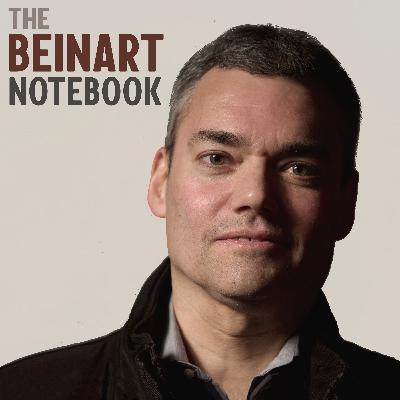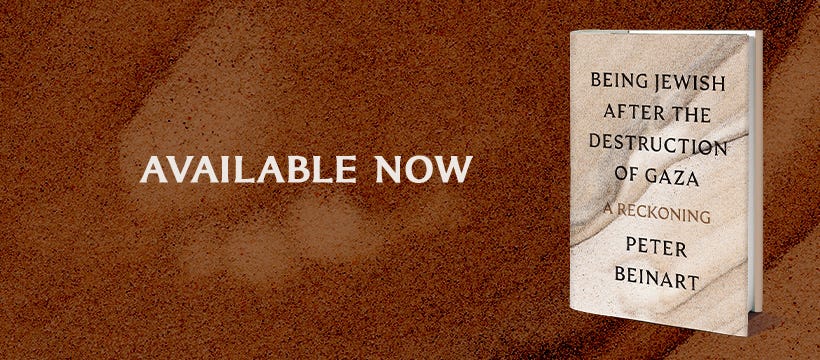The Other Political Violence
Description
Please Help Palestinians in Gaza.
There is no Zoom call this Friday. We’ll return on Friday, October 3.
With the Jewish High Holidays approaching, I’m opening up for all readers my conversation with Rabbi Ismar Schorsch, former chancellor of the Jewish Theological Seminary, who argues that what Israel is doing in Gaza and the West Bank constitutes a stain on Judaism itself.
Cited in Today’s Video
Ezra Klein and Ta-Nehisi Coates on the murder of Charlie Kirk.
Things to Read
(Maybe this should be obvious, but I link to articles and videos I find provocative and significant, not necessarily ones I entirely agree with.)
In Jewish Currents (subscribe!), Alex Kane writes about the aid group favored by pro-Israel organizations.
Leonard Benardo interviews Rob Malley for the Ideas Letter.
In The New York Times, I wrote about the Trump Administration’s use of Charlie Kirk’s murder to crack down on dissent
For the Foundation for Middle East Peace, I interviewed David Adler, who is aboard the Sumud flotilla heading to Gaza.
On Monday September 22, I’ll be discussing the parallels between Israel’s response to 10/7 and America’s response to 9/11 for the Quincy Institute.
See you a week from Friday,
Peter
VIDEO TRANSCRIPT:
So, a really interesting debate broke out, last week between Ezra Klein and Ta-Nehisi Coates about the legacy of Charlie Kirk. Ezra Klein wrote a column in which he said that Charlie Kirk was practicing politics in the right way because he was trying to persuade people. He was going to college campuses where, you know, lefty students are around, and he was engaging them in argument. And he contrasted this persuasion with this rising political violence that we see in America.
And Coates was challenging that binary, and I want to explain why I agree with Coates. As I understand it, I think the point that Coates is making is not just that the kind of persuasion that Charlie Kirk is engaged in isn’t really good faith discourse, that it’s more like demagoguery, right, in which he tries to kind of make his political opponents look like fools, especially through the kind of editing of these interactions he’s having on college campuses.
But I think the point is actually deeper, which is to question what we mean when we use the term political violence. Generally, the way this is used is that we’re thinking about violence by non-state actors. So, a lot of people have been saying we’re in a rising era of political violence because of the murder of Kirk, and the attempted assassination of Donald Trump, and the attack on Paul Pelosi, and the killing of this Minnesota state representative, and that’s what we define as political violence.
But it’s worth noting that what that leaves out is political violence by the state, right? Violence by the state for a political purpose. It’s a little like the way we use the term terrorism, which is also basically a synonym for political violence, but only gets applied, really, generally, to non-state actors. So, we generally don’t think of the things that states do as political violence or as terrorism, although sometimes we make an exception for states we really don’t like, like Iran, let’s say, right?
But states commit lots and lots of political violence, and states create lots of terror, right? If terrorism is making people feel terrified for a political purpose, then states do that a lot. And I think what Coates is doing is he’s looking at the language that Charlie Kirk is employing, the way he’s talking about trans people, the way he’s talking about Muslim people. And, of course, Charlie Kirk is not directly using violence against anybody. And it should go without saying, it should be obvious, of course, that it was fundamentally, completely wrong for this person to murder him, and that person should be prosecuted to the full extent of the law.
But I think what Coates is getting at is that when we think about this binary between persuasion and violence, we have to think about the fact that Charlie Kirk was explicitly supporting a lot of violence by the state. Violence that now we’re seeing, particularly in the Trump era, right? Terrible, terrible violence that’s being used by the state against people who are claimed to be violating immigration laws, against people who are disfavored by the Trump administration in all kinds of ways. And to be fair, the definition of a state is that entity which has a monopoly on legitimate violence. But I think the question that Coates is raising is how we think about legitimate versus illegitimate political violence when it involves the state, rather than simply using the category of political violence to imply that all violence by the state is legitimate, and the only illegitimate political violence is used by non-state actors.
And I think this, you know, this bears also on the question of Israel and Palestinians. As I’ve said many, many, many, many times, I think the terrorism that was used by Hamas on October 7th was fundamentally wrong. It targeted civilians and inflicted terrible, terrible violence and cruelty, and indeed, terror, right? But it’s also, it seems to me, pretty undeniable that the state of Israel is imposing a tremendous amount of terror on Palestinians. We think of just ordinary Palestinians in Gaza who don’t know, you know, whether they’ll be able to feed their children, or whether they’re going to be destroyed in a bus, you know, in a bombing tomorrow, right? It’s unbelievable amounts of terror being experienced by Palestinians in the West Bank and Gaza.
And so, I think what Coates is getting at here is to question the way in which we use terms like terrorism and political violence to excuse the unlawful violence, or the unlawful infliction of terror by states, whether it’s Israel or the United States, or for that matter, another state. Again, none of which is to justify the use of political violence, and indeed, the use of terror by non-state actors. But it suggests that this problem of violence, this problem of the infliction of terror on people for political means without legal justification is not only a problem that we see with non-state actors, it is also very, very much a problem of states especially in this age in which we’re seeing rising authoritarianism and very, very explicit and brutal racism—in the case of Israel, even genocide being inflicted on people.
And I think this is where it’s really, really important to think carefully. Again, this is one of the points that George Orwell made so, so famously, to think carefully about the language we use, and whether it’s really being used honestly. And I think if we use the term political violence honestly, we have to remember that while we may be in an age of very dangerous political violence by non-state actors, we are also very, very profoundly in an age of very, very dangerous political violence by the state. And that should not be ignored in this conversation.
This is a public episode. If you'd like to discuss this with other subscribers or get access to bonus episodes, visit peterbeinart.substack.com/subscribe

















